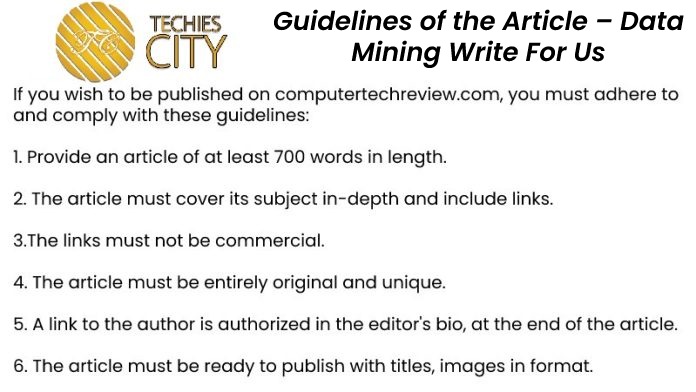Data Mining Write For Us – Data mining can seem daunting, but it doesn’t have to be. With this comprehensive guide, you’ll soon be an expert at sifting through and summarizing large datasets to identify patterns and extract valuable insights.
What is Data Mining?

Data mining is discovering patterns in structured data by analyzing large datasets to find relationships, correlations, and other insights. By leveraging powerful computing techniques, data mining enables organizations to make informed decisions by uncovering hidden trends, predicting future customer behaviour, and helping detect fraud and other anomalies.
Data mining utilizes a variety of techniques, including both statistical and artificial intelligence techniques such as neural networks, machine learning algorithms, natural language processing, and deep learning. It is also used to reveal previously unknown relationships within the data. Data mining is often used with other analytics technologies, such as data visualization or business intelligence, to provide greater insight into the analyzed datasets and assist with decision-making. With access to large amounts of data and advanced analytical tools, companies across many industries are discovering valuable insights through data mining.
To Write to Us, you can contact us at contact@techiescity.com
Data Sources and Structures
To effectively use data mining, it is essential to be familiar with the data sources and structures in which the data resides. Identifying whether the data is structured, semi-structured, or unstructured will help determine how best to work with and analyze it. Structured data is organized into rows and columns and stored in a relational database like an Oracle or Microsoft SQL Server. In contrast, semi-structured data is stored in flat files like XML or CSV text files. Unstructured datasets, on the other hand, usually take the form of text documents or images not formatted into structured tables.
Data Cleaning and Pre-Processing
Data cleaning or clearing data is a critical step in the data mining process to ensure that any analyses are robust and accurate. It involves identifying missing, corrupt, duplicated, or incorrect values and correcting them to conform to a predetermined set of standards. Pre-processing then follows, which is the process of transforming raw data into a format more suited for analysis and machine learning. This can involve techniques such as scaling variables to lie between 0 and 1 or filling in missing values with statistical estimates like the mean value. Knowing how your data is formatted before diving into the analysis will help speed up your workflows significantly.
Different Types of Data Mining Techniques

Understanding which data mining technique to use and in what situation is critical for successful data extraction. Standard procedures include regression analysis, decision tree induction, clustering, association rule learning, support vector machines, and deep learning. Each method can be better suited to a particular type of task or situation, such as regression analysis having the advantage of being interpretable and useful in historical time series prediction. At the same time, artificial neural networks are better suited to image recognition tasks. Understanding when to pick each tool is key to mastering data mining.
Regression analysis is a data mining technique which predicts future outcomes based on present findings. It considers historical data following the line of best fit and more refined patterns in measurements like relative correlations. Decision tree induction uses decision trees, branches and nodes to create algorithms that can be used to classify particular data points. Clustering is a more exploratory type of data mining. It involves grouping data into clusters based on similarity, while association rule learning looks at relationships between variables in different datasets and then uses those to make predictions. Support vector machines seek maximum margin solutions by carefully dividing available planes and adapting to changing boundary conditions. Finally, deep learning finds data patterns using multiple layers of artificial neural networks within dimensional views of a dataset.
Evaluating the Results of a Data Mining Project
An essential part of understanding and mastering data mining is learning how to evaluate the results of a project critically. Once you have used a data mining technique to extract, analyze, and interpret patterns from the data, it’s essential to assess the validity of your results. This can be done in multiple ways, such as using known metrics like precision, recall, accuracy or F-measure; assessing model stability with cross-validation or bootstrapping; visualizing results through descriptive analytics; or consulting domain experts or end users. By properly evaluating the results of your project, you will be able to get the most out of your data and accurately serve the needs of end-users.
How to Submit Your Articles?
To Write to Us, you can e-mail us at contact@techiescity.com
Why Write for Techies City – Data Mining Write For Us

Related Terms of Data Mining Write For Us
data mining tutorial
non-linear regression in data mining
pdf data mining and data warehousing
data mining and data warehousing notes
Edureka data mining
data warehouse course free
fundamentals of data warehousing and data mining
linear regression data mining
Search Terms for Data Mining Write For Us
become a guest blogger
submit post
write for us
writers wanted
guest post
looking for guest posts
guest posts wanted
“guest post”, “guest blogging”, or “write for us.”
blogging write for us
blogging + writing for us
consulting guest blogging opportunity write for us
coaches guest blogging opportunity write for us
“guest post”, “guest blogging”, or “write for us.”
blogging+travel “write for us.”
guest blogging + “write for us.”
write for us + guest blogging
guest posting guidelines
become an author
suggest a post
submit an article
guest posts wanted
guest blogging + “write for us.”
write for us + guest blogging
in URL:” write-for-us.”
“write for us,” “blogging tips.”
blogging “write for us.”
contributor guidelines
contributing writer
write for us blogging
blogging tips write for us
blogging + “write for us”
Software Data Mining
The best Data Mining in India
Data Mining Costs
Data Mining Process
Guidelines of the Article – Data Mining Write For Us

You can contact us by email at contact@techiescity.com
